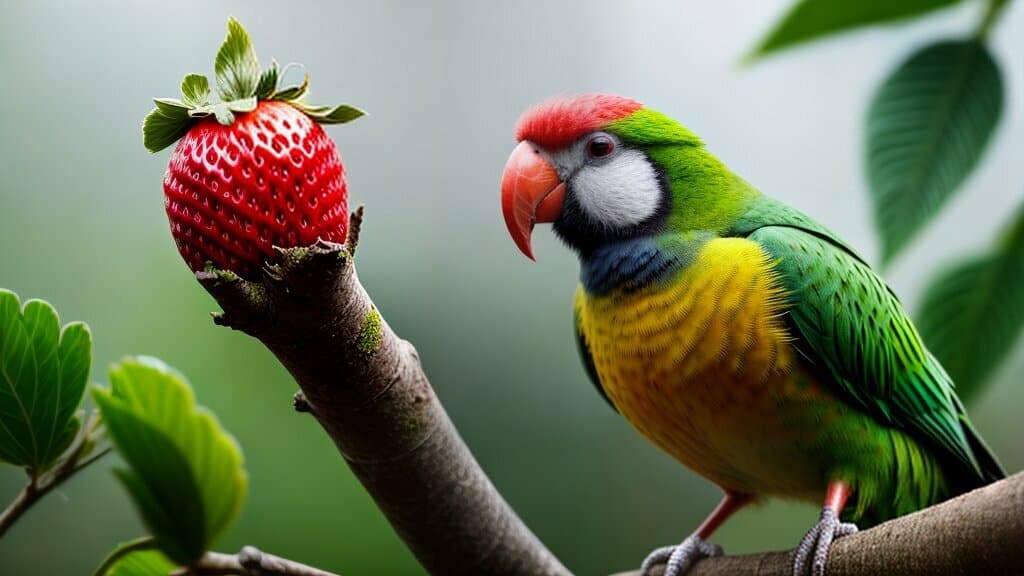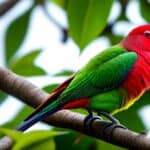If you’re a proud owner of a kakariki, you’re probably curious about what kinds of foods you can safely feed your feathered friend. One common question that many pet owners have is whether kakarikis can eat strawberries. We’ve got the answers you’re looking for!
Can Kakarikis eat strawberries? Kakarikis can eat strawberries. Strawberries are a safe fruit option for these small birds. High in vitamins, especially Vitamin C, they provide nutritional benefits. However, moderation is key to maintaining a balanced diet for kakarikis. It’s crucial to wash strawberries thoroughly before offering them, to remove any pesticides or chemicals that could be harmful.
Before diving headlong into whether it’s safe for kakarikis to eat strawberries, let’s discuss their dietary needs and preferences.
Key Takeaways:
- Kakarikis are a type of parakeet that have specific dietary needs.
- Understanding their food preferences is important to ensure they get the proper nutrients.
Kakariki Dietary Needs and Food Preferences
Kakarikis are parrots native to New Zealand, often kept as pets due to their friendly and playful nature. Like all birds, kakarikis have specific dietary needs and food preferences that are vital to their health and well-being.
In the wild, kakarikis feed on diverse foods, including seeds, fruits, berries, flowers, and insects. As pets, they should be offered a varied, balanced diet that meets their nutritional requirements.
| Dietary Needs | Food Preferences |
|---|---|
|
It is important to note that kakarikis have a sensitive digestive system and are prone to obesity and other health issues if fed an imbalanced or inadequate diet. Therefore, offering a variety of foods and monitoring their intake is crucial for their overall health and longevity.
Understanding the Nutritional Value of Strawberries
Strawberries are not only tasty, but they are also packed with essential nutrients that can benefit your kakariki’s health. These tiny, bright red fruits are a great source of Vitamin C, which is essential for the immune system, as well as for growth and repair of tissues.
Aside from Vitamin C, strawberries contain various antioxidants that help the body protect itself from harmful toxins and reduce the risk of chronic illnesses, such as cancer and heart disease.
Moreover, strawberries are low in calories and high in fibre, which can aid digestion and help maintain a healthy weight for your feathered friend.
However, feeding your kakariki a strawberry diet is not recommended, as they need a balanced and varied diet to meet all their nutritional needs. Nonetheless, incorporating strawberries into their regular diet can boost essential nutrients.
Can Kakarikis Safely Eat Strawberries?
While strawberries may seem like a tasty treat for your feathered friend, it’s important to consider whether they are safe for kakarikis.
Some fruits, including strawberries, can pose a potential risk due to their high levels of natural sugars, leading to digestive problems and weight gain in birds.
Additionally, strawberries contain small amounts of oxalic acid, which can potentially interfere with calcium absorption if consumed in large quantities.
However, the occasional small piece of strawberry is unlikely to cause harm to your kakariki. As with any new food, gradually introducing strawberries into your bird’s diet is important to monitor their reactions and ensure they do not experience any adverse effects.
If you feed your kakariki strawberries, ensure they are fresh, ripe and thoroughly washed to remove any pesticides or dirt.
It’s also important to remember that
Strawberries should never be the sole source of your bird’s diet and should be fed in moderation alongside other safe fruits and vegetables.
Incorporating Strawberries Into a Kakariki’s Diet
If you’ve decided to introduce strawberries into your kakariki’s diet, it’s important to do so gradually. Start with small quantities to allow your feathered friend to adjust to this new fruit.
Choosing only ripe strawberries is essential, as unripe ones may be difficult for your kakariki to digest. Ensure the strawberries are washed and free from pesticides or chemicals before serving them to your bird.
While strawberries are safe for kakarikis, they should not make up the bulk of their diet. As with all fruits, moderation is key.
Other safe fruits for kakarikis to eat include apples, pears, bananas, and grapes. Remember to remove any seeds or pits before serving these fruits to your bird.
It’s also important to note that some fruits, such as avocado, should never be fed to kakarikis as they contain harmful toxins.
Incorporating a variety of fruits into your kakariki’s diet is essential for providing a balanced and nutritious diet. As always, consult your veterinarian if you have any concerns about your bird’s diet.
Serving Strawberries to Kakarikis
Now that you know that kakarikis can safely enjoy strawberries, you must ensure you serve them correctly. Here are some tips:
- Wash the strawberries thoroughly and remove any stems or leaves before serving.
- Slice the strawberries into small pieces to make them easier for your kakariki to eat.
- Offer strawberries as a treat or supplement to your kakariki’s regular diet, not as a replacement for their main food.
- Limit the amount of strawberries you give to your kakariki to avoid overfeeding or upsetting their stomach.
Remember, every bird is different; some kakarikis may not immediately take to strawberries. Monitoring your bird’s reactions and adjusting their diet is important.
Following these guidelines, you can safely incorporate strawberries into your kakariki’s diet and provide them with a tasty and nutritious treat!
Monitoring Your Kakariki’s Health and Reactions
While strawberries are generally safe for kakarikis to consume in moderation, monitoring your bird’s health and reactions after introducing them to this fruit is important.
| Signs of Positive Reaction | Signs of Negative Reaction |
|---|---|
| Greater energy and activity levels | Loss of appetite |
| Brighter feather colours and shine | Diarrhoea or loose droppings |
| More vocalisation and playfulness | Lethargy or weakness |
If your kakariki shows any signs of negative reaction after eating strawberries, it is important to discontinue feeding them this fruit and consult a veterinarian if symptoms persist.
Additionally, it is important to ensure that strawberries are only a small part of your kakariki’s overall diet. Too much fruit can lead to an imbalance in their nutritional intake, so it is recommended to provide a variety of foods and treats to keep their diet varied and balanced.
Alternative Treats for Kakarikis
While strawberries can be a great addition to your kakariki’s diet, it’s important to provide a variety of treats to ensure a balanced diet.
Some safe and healthy options include:
- Fresh or frozen blueberries
- Slices of apple, pear or banana
- Chopped carrots or sweet potato
- Small amounts of cooked brown rice or quinoa
It’s important to avoid giving your kakariki any foods high in fat, salt or sugar, as these can harm their health. Also, avoid giving them avocado, chocolate, caffeine or alcohol, as these can be toxic to birds.
Always introduce new foods slowly and monitor your kakariki’s reaction to them. If you notice any signs of digestive distress or discomfort, stop feeding the new food and consult with your veterinarian.
In Conclusion
So, can kakarikis eat strawberries? The answer is yes! Strawberries are safe for kakarikis to consume and offer a range of nutritional benefits.
It’s important to remember to introduce new foods to your kakariki’s diet gradually and monitor their reactions. If your bird experiences any adverse effects after eating strawberries, discontinue the fruit and consult a veterinarian.
While strawberries can be a healthy addition to your kakariki’s diet, it’s important to ensure they are balanced and varied. Including a range of safe fruits and treats will help to provide your bird with the necessary nutrients and keep them happy and healthy.
A Final Word
As with any pet, providing your kakariki with a balanced and nutritious diet is essential to promote their health and well-being. Following the guidance outlined in this article, you can safely introduce strawberries and other fruits into your bird’s diet and give them a tasty treat they’ll love.
FAQ
Q: Can Kakarikis Eat Strawberries?
A: Yes, kakarikis can safely eat strawberries as part of their diet.
Q: What are the general dietary needs of kakarikis?
A: Kakarikis have specific dietary needs that include a combination of fruits, vegetables, seeds, and pellets to ensure their nutritional requirements are met.
Q: Do kakarikis have any food preferences?
A: Kakarikis have individual food preferences, but they generally enjoy a variety of fruits, vegetables, and seeds.
Q: What is the nutritional value of strawberries?
A: Strawberries are low in calories and high in vitamin C, fiber, and antioxidants, making them a nutritious treat for kakarikis.
Q: Are strawberries safe for kakarikis to eat?
A: Yes, strawberries are safe for kakarikis to eat. However, removing any stems or leaves and washing them thoroughly before serving is important.
Q: How can I incorporate strawberries into my kakariki’s diet?
A: You can introduce strawberries gradually by offering small pieces as a treat or mixing them with other fruits and vegetables in their regular diet. It’s also important to provide a balanced variety of other safe fruits for their overall nutritional needs.
Q: How should I serve strawberries to my kakarikis?
A: To serve strawberries to kakarikis, slice them into small, bite-sized pieces and offer them in a clean bowl or dish. Avoid adding any sweeteners or seasonings.
Q: What should I monitor when feeding strawberries to my kakarikis?
A: It’s important to monitor your kakariki’s health and reactions when introducing strawberries to their diet. Watch for any signs of digestive upset or allergic reactions and consult a veterinarian if you have any concerns.
Q: Can I offer my kakarikis any alternative treats or fruits?
A: Yes, there are several alternative treats and safe fruits that kakarikis can enjoy, including apples, pears, and blueberries. It’s important to provide a variety of foods to ensure a balanced diet.



Have comments or questions about this article? Then get involved!
Spotted an error or something we have missed? Let us know